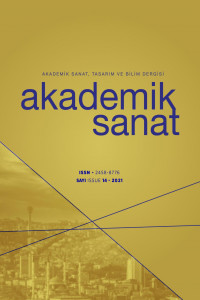Öz
This study examines well-known examples scence fiction film that used of as characters stereotypes and stories in literature (English, American and French and Russian novels). This study aim to how to gothic novels transform to sci fi. In addition, the interaction of science fiction cinema and phonetic arts and mixed arts with philosophy from scriptures to classical literature will be discussed. For example, Philip K. Dick's short story Minority Report which written in 1956, was adapted to the cinema Steven Spielberg's (2002) title as same name: Minority Report. In another example, the movie, Gattaca, was highly influenced by Aldous Huxley's science fiction story Brave New World (artificial birth, classification etc.). It can be seen that classic science fiction films such as Gattaca, Blade Runner, Terminator, The Matrix, Avatar, A.I, Ailen and Truman Show refer to narratives and tales, especially the Bible or Shelley's novel: Frankenstein. Significant examples of science fiction cinema, fall into the field of study. P.K Dick, H. G. Wells, Aldous Huxley, Mary Shelley, Isaac Asimov, Shakespeare, Kafka, and George Orwell in this study, which will examine the adaptation of the works of important science fiction writers directly or indirectly to the cinema, the literature will be searched and visual data will be frequently used. In the study in which science fiction cinema will also be dealt with the interaction from philosophy issues such as intertextuality in cinema-literature will be primarily examined. While this study centers on more current and original examples, the intertextuality between story and character forms the framework of the study. In this respect, while using the works of important names as a source, it was also aimed to make original determinations.
Anahtar Kelimeler
science fiction intertextuality literature and cinema philosophy and cinema
Kaynakça
- Referans1 Cornea, Christine, (2007) Science Fiction
- Referans2 Marland, John; Rawle, Steven
Öz
This study examines well-known examples scence fiction film that used of as characters stereotypes and stories in literature (English, American and French and Russian novels). This study aim to how to gothic novels transform to sci fi. In addition, the interaction of science fiction cinema and phonetic arts and mixed arts with philosophy from scriptures to classical literature will be discussed. For example, Philip K. Dick's short story Minority Report which written in 1956, was adapted to the cinema Steven Spielberg's (2002) title as same name: Minority Report. In another example, the movie, Gattaca, was highly influenced by Aldous Huxley's science fiction story Brave New World (artificial birth, classification etc.). It can be seen that classic science fiction films such as Gattaca, Blade Runner, Terminator, The Matrix, Avatar, A.I, Ailen and Truman Show refer to narratives and tales, especially the Bible or Shelley's novel: Frankenstein. Significant examples of science fiction cinema, fall into the field of study. P.K Dick, H. G. Wells, Aldous Huxley, Mary Shelley, Isaac Asimov, Shakespeare, Kafka, and George Orwell in this study, which will examine the adaptation of the works of important science fiction writers directly or indirectly to the cinema, the literature will be searched and visual data will be frequently used. In the study in which science fiction cinema will also be dealt with the interaction from philosophy issues such as intertextuality in cinema-literature will be primarily examined. While this study centers on more current and original examples, the intertextuality between story and character forms the framework of the study. In this respect, while using the works of important names as a source, it was also aimed to make original determinations.
Anahtar Kelimeler
science fiction intertextuality literature and cinema philosophy and cinema
Kaynakça
- Referans1 Cornea, Christine, (2007) Science Fiction
- Referans2 Marland, John; Rawle, Steven
Ayrıntılar
| Birincil Dil | İngilizce |
|---|---|
| Bölüm | Makaleler |
| Yazarlar | |
| Erken Görünüm Tarihi | 26 Aralık 2021 |
| Yayımlanma Tarihi | 28 Aralık 2021 |
| Kabul Tarihi | 2 Aralık 2021 |
| Yayımlandığı Sayı | Yıl 2021 Sayı: 14 |
Kaynak Göster


